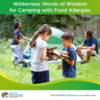Are you hesitant to head into the wilderness with food allergies? Don't be. Children are among those who can gain the most from nature—and children with food allergies are no exception.
You will enjoy the many entertaining and inexpensive benefits nature has to offer. Discover this food-allergy friendly activity for yourself!
Traditional vacations often involve eating meals at restaurants. Compare that with camping, where you prepare and cook your own food.
Steven Place is a former Boy Scout with allergies to tree nuts, corn, and cow's milk. He has camped many times. He understands the importance and benefit of taking safe foods on the trail.
"Camping offers 99% control over activities and what foods your child will consume. You would never be able to control that on a vacation where you had to eat out every night," he said.
You can cook many of the same foods you do at home at a campsite. It is best to cook only safe foods for everyone in your group since it is harder to clean pots, pans and utensils thoroughly to prevent cross contamination. You should also avoid cooking directly on the campsite's grill. It could have food residue from previous campers. Instead, cook over a campfire or bring your own propane camping stove or burner.
Kathy Przywara, a California mom, likes to use a Dutch oven (a cast iron pot with a snug lid) for cooking while camping. The Girl Scout leader recommends seasoning it before use, and lining it with aluminum foil for easy clean up.
"I often cook in aluminum pie or cake pans that fit my oven," said Kathy. "You can make anything from potatoes to apple crisp. If you prepare things in foil dishes, you can use one oven to cook sequential parts of the meal. You just need to make sure you have enough coals to last. For instance, I've done ‘unscalloped potatoes' (potatoes, onions, capers, chicken broth) in a foil dish for dinner. Then I’ve popped in an apple crisp for dessert to cook while we ate."
Kathy, who goes by "Kathy P" on the Kids With Food Allergies Community Forums, recommends using double layers of heavy foil and grease to keep food from sticking.
"Layer potatoes, veggies, meat and seasonings. Seal up in a pouch tightly and cook in or over the coals," she said.
Kabobs also work well. For this, be sure to bring an old grill rack to set over the coals.
Don't forget dessert, Kathy added. Banana boats can easily become a family favorite. "Split a banana in the skin, but not all the way through. Stuff with mini marshmallows and safe chocolate chips. Wrap in foil and bake in hot coals for 20 minutes until everything is soft and melted," she said. If you are managing a banana allergy, try using apples or pears.
Once you've planned what safe foods to take, don't forget to secure them at night or when leaving the campsite to prevent from attracting bears or other wildlife.
Despite your best efforts, your child may still come into contact with something that causes a severe allergic reaction, known as anaphylaxis.
Do not forget your epinephrine auto-injectors, the only treatment for anaphylaxis. Bring at least two auto-injectors. Check the expiration dates before leaving for the woods. Protect them from extreme temperatures. In summer, keep them in the shade and never leave them in the car. Also, bring your updated written emergency action plan, even if you never leave your child's side.
If you have allergic rhinitis or asthma triggered by smoke from the campfire or other outdoor allergens, make sure to have those conditions under control. Pollen, campfire smoke and mold can all be unwelcome allergy triggers when camping. Bring any prescribed antihistamines and asthma rescue inhalers with you as well in case you need them.
As an extra precaution, research cell phone coverage at your destination before you leave. Many remote areas don't have coverage. If you are visiting a national park, contact the park ranger for emergency procedures in the event of a reaction. Also, find out the location of the nearest medical facility.
The unpredictable nature of allergic reactions can create stress when camping. But if you are well-prepared and play it safe, you're guaranteed to take home lots of lasting memories. Always have a plan in case of an emergency while keeping epinephrine with you at all times.
Wilderness Words of Wisdom:
Follow these rules to ensure your next camping trip is worry free—and worth it!
1. Pack safe foods. Campsite cooking and cleaning can be challenging and messy. Use only safe foods so everyone can enjoy meals at ease.
2. Bring life-saving medication and a written emergency action plan. Written directions will instruct emergency personnel how to properly treat your child if they experience an allergic reaction outside of your care.
3. Keep epinephrine auto-injectors away from extreme temperatures. They should be stored at room temperature and kept away from excessive heat (such as a glove compartment) or cold.
4. Research cell phone coverage. Cell phones may not work in some wilderness areas, regardless of your service. Ask a park ranger for details.
5. Find the nearest medical facility. In case of an emergency, it is important to know the closest medical center and local emergency practice.


Comments (0)